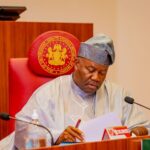The recently proposed N49.7 trillion budget by President Bola Ahmed Tinubu has sparked widespread debate across the nation. As the largest budget in Nigeria’s history, it reflects the administration’s ambitious plans to address critical challenges and stimulate economic growth. However, the sheer size and scope of this budget demand rigorous scrutiny by the National Assembly to ensure it aligns with national priorities and adheres to principles of transparency, accountability, and sustainability. The legislature’s role in reviewing this budget cannot be overstated, as its approval or rejection will significantly impact the nation’s socioeconomic trajectory.
The timing of this budget proposal is particularly crucial. Nigeria is grappling with a plethora of economic challenges, including rising inflation, a depreciating naira, high unemployment rates, and an ever-expanding debt profile. These issues have eroded public trust in government policies and exacerbated poverty levels. Against this backdrop, the budget’s ambitious size raises critical questions about its funding sources and long-term viability. It is essential for the National Assembly to rigorously examine the revenue projections that underpin this budget, particularly those related to taxes, oil revenue, and external borrowing.
A closer look at Nigeria’s fiscal reality reveals several concerns. The government has increasingly relied on taxation to generate revenue, evident in policies such as the removal of fuel subsidies and the introduction of new levies. While these measures aim to boost government coffers, their impact on an already burdened populace must be carefully assessed. The National Assembly must demand clarity on how these policies will be implemented to minimise adverse effects on the most vulnerable Nigerians. Furthermore, projected oil revenues, often a cornerstone of Nigeria’s budget, require realistic assumptions about global oil prices and domestic production capacity. the lawmakers must ensure that these projections are neither overly optimistic nor disconnected from current market realities.
The expenditure framework of the proposed budget also demands thorough evaluation. How much of the N49.7 trillion is earmarked for critical sectors like education, healthcare, and infrastructure? Nigeria’s social indicators paint a grim picture: millions of children remain out of school, healthcare facilities are grossly inadequate, and infrastructure deficits continue to hinder economic growth. The National Assembly must scrutinize whether allocations to these sectors are sufficient and whether they address the root causes of the nation’s developmental challenges. For instance, significant investments in education and healthcare are essential for building a productive workforce and reducing poverty. Similarly, targeted infrastructure projects can stimulate job creation and enhance economic competitiveness.
- Wounded man discharged over unpaid medical bills seeks help
- How Adamawa State-owned companies became moribund
Another pressing issue is the implementation of the proposed budget. Nigeria’s history is replete with examples of budgetary leakages, waste, and corruption. Funds allocated for critical projects often fail to reach their intended destinations, resulting in stalled projects and unmet objectives. To prevent a recurrence of such inefficiencies, the National Assembly must demand robust implementation plans and monitoring mechanisms. This includes insisting on clear timelines, measurable outcomes, and penalties for non-compliance. Legislators should also advocate for greater citizen engagement in the budget process to foster accountability and transparency.
Debt sustainability is another critical area that requires the National Assembly’s attention. Nigeria’s public debt is nearing N87 trillion, a figure that has raised alarms among economists and international financial institutions. With the proposed budget likely to rely heavily on borrowing, lawmakers must interrogate the terms and conditions of these loans. Are they concessional or commercial? What are the repayment timelines, and how will they impact future generations? The legislature must prioritize strategies that balance the need for immediate development with long-term fiscal prudence. Additionally, efforts should be made to explore alternative revenue sources, such as improving tax compliance, curbing illicit financial flows, and diversifying the economy.
The N49.7 trillion budget also provides an opportunity for the National Assembly to reassert its constitutional role as a check on the executive arm of government. In recent years, there has been growing concern about the legislature’s tendency to rubber-stamp executive proposals without adequate scrutiny. Such practices undermine democratic governance and erode public confidence in the legislative process. By subjecting the budget to rigorous analysis, the National Assembly can demonstrate its commitment to safeguarding the public interest and upholding its mandate to represent the people.
Ngu, public affairs commentator wrote from Kaduna State

 Join Daily Trust WhatsApp Community For Quick Access To News and Happenings Around You.
Join Daily Trust WhatsApp Community For Quick Access To News and Happenings Around You.


